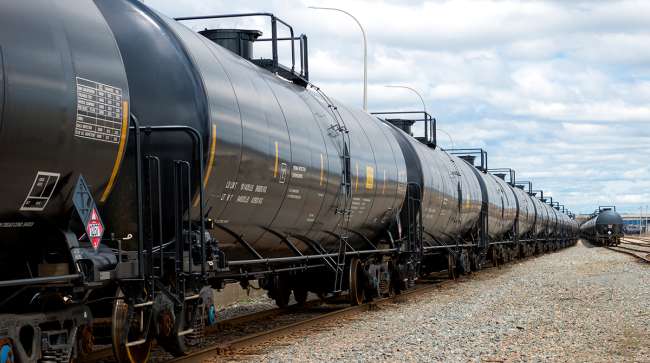Senior Reporter
PHMSA Issues Rule Requiring Oil Spill Response Plans for Flammable Trains

The Pipeline and Hazardous Materials Safety Administration has issued a final rule that requires railroads to develop and submit comprehensive oil spill response plans for route segments traveled by high-hazard flammable trains.
The rule applies to trains that are transporting petroleum oil in a block of 20 or more loaded tank cars and trains that have a total of 35 loaded petroleum oil tank cars.
The 174-page final rule provides regulatory flexibility and improves response readiness to mitigate the effects of rail accidents and incidents involving petroleum oil and the flammable trains, PHMSA said in a Feb. 14 announcement. The agency said the rule also is needed due to expansion in U.S. energy production having led to “significant challenges for the country’s transportation system.”
It revises the oil spill response plan requirements that currently oblige railroads to establish geographic response zones along various rail routes and ensures that both personnel and equipment are staged and prepared to respond in the event of an accident.
We've announced a final rule to to strengthen #oilspill response preparedness for high-hazard oil trains https://t.co/AjuWuwY8hi #rail pic.twitter.com/9p4rjGoZJ5 — PHMSA (@PHMSA_DOT) February 14, 2019
“Furthermore, railroads are required to identify the qualified individuals responsible for each response zone, as well as the organization, personnel, and equipment capable of removing and mitigating a worst-case discharge,” the agency said. “The rule also requires rail carriers to provide information about high-hazard flammable trains to state and tribal emergency response commissions in accordance with the Fixing America’s Surface Transportation Act of 2015.”
In addition, the rule calls for a “reasonable estimate” of the number of high-hazard flammable trains that are expected to travel, per week, through each county within a state.
“The rail transportation of large volumes of crude oil and other petroleum products presents unique safety risks,” the final rule said. “Rail accidents have tracked changes in production and rail shipments of crude oil — rising when rail shipments increase in volume and falling when crude oil volumes fall according to Federal Railroad Administration and PHMSA incident report data.”
The rule cited as an example of the potential dangers a July 6, 2013, incident when an unattended, runaway unit train carrying crude oil from the Bakken region of North Dakota derailed in the town of Lac-Mégantic, Quebec.
“The incident resulted in loss of life and destruction of property and the environment,” PHMSA said. “While an OSRP may not have prevented this incident, the Lac-Mégantic incident prompted examination into the safety of crude oil transportation by rail.”


